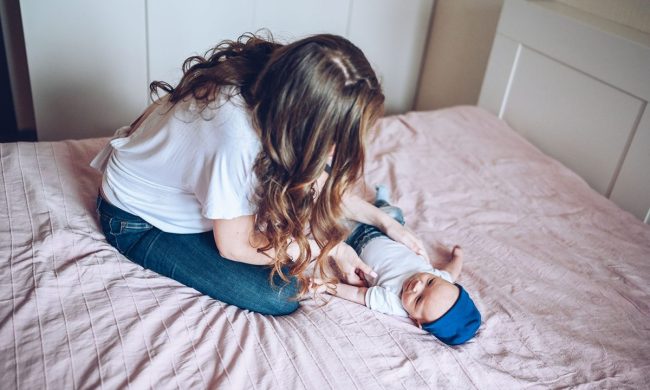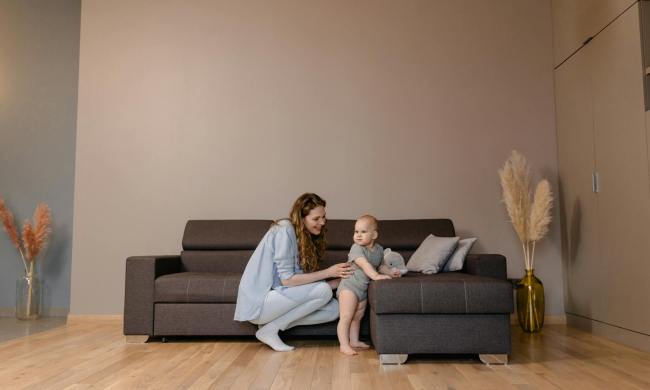Kids love their sleep. Newborns seem to constantly be asleep, and infants still nap for a good portion of the day. As your child becomes a toddler, nap times are events you schedule your whole day around. But when do babies stop napping, and when will their sleep schedule change?
As with most other milestones, every baby will be different when it comes to when they decide to give up all naps. If you like to have a general idea of when your child will no longer need to be home for nap time, we have the guide to refer to for when your baby will skip naps completely.
When babies give up nap time

- Most children give up naps between 2 and 5 years old.
- An extremely small percentage of children stop napping before 2 years old.
- Between 3 and 4 years old is the most common age when naps stop.
- By 5 years old, your child shouldn’t take naps anymore.
When you have a toddler, you realize that little body can go at the highest speed for what seems like an impossible length of time without stopping. Some days make you yearn for nap time just to drink a cup of coffee or sit down for a second. But in addition to super-human strength, toddlers start to give up their naps.
It would be uncommon, but a small percentage of children stop napping by 2 years old. For the rest, by the age of 5, around 94% of children no longer nap. So, the sweet spot for babies giving up naps is between 2 and 5 years old, with the majority around 3 to 4 years old. It can’t really be narrowed down more than that because each child is different and every family’s routine varies. If your child is turning 2, you can be on the lookout for nap time to be dropped soon.
How to know your baby no longer needs to nap

As with hunger and sleep cues, you can deduce when your child is over taking naps.
- Your child takes 30 minutes or more to fall asleep at bedtime.
- It takes 30 minutes or longer for your child to fall asleep at nap time.
- Your child doesn’t fall asleep at nap time at all.
- Your child becomes irritated when it’s time for a nap.
- Your child wakes up in the middle of the night and can’t go back to sleep.
It takes kids a minute or two to settle down, but if it’s been 30 minutes and your child still isn’t asleep, their sleep schedule is off, and their daytime nap could be the culprit. When you put your child down for a nap and they stay awake, either playing, singing to themselves, or tossing and turning the whole time, they could be over naps. Pay attention if your child becomes irritated when it’s time for a nap and the idea of a nap makes them upset.
If your child has been experiencing all of these (or more than one) for at least five days, your little one could be ready to skip naps for good.
How to know it’s something else and not nap-dropping time

Now, your child taking extra time to fall asleep doesn’t automatically mean they are done with naps, so don’t start skipping them the next day.
- If there have been any changes in the child’s life, like a move or new addition to the family.
- If your child is showing symptoms of being overtired.
Any big life changes like a new baby, a new house or living situation, or a life event that disrupts the child’s normal routine could throw their entire sleep schedule off. It doesn’t mean they are over naps, but it could mean they don’t know how to process the change and their nap is paying the price. If your child is having big emotional releases, is cranky, and shows other signs of tiredness, they aren’t ready to stop taking naps and need to be on a stricter sleep schedule.
How much sleep should your child get?

- A 2-year-old should still get between 11 and 14 hours of sleep, and that includes napping.
- A 3-year-old should sleep between 10 and 13 hours, including naps.
- A 4- and 5-year-old should get the same sleep as a 3-year-old.
Children need a lot of sleep to function properly. Just as your sleep is important to go to work, run errands, clean, cook, and do everything an adult human needs to do, a child needs their sleep to play, go to school, and be a kid.
Naps help children get the rest they need to finish their day and develop properly. Naps help adults catch up on tasks and be able to eat something hot. If you have an infant, the question of when do babies stop napping is in the back of your mind. The answer is it’s right around the corner, as young as 2, but as old as 5 years old. Parents, if you have a baby or toddler, enjoy those naps and make the most of the time the way you want, because nap time will be over before you know it.




